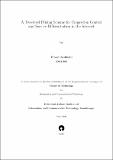Two-level pricing scheme for congestion control and service differentiation in the Internet
Abstract
It is the property of any good service provider that, if a user is ready to pay for the services he demands, the provider will ensure that the requested level of service is made available. Is this possible in the Internet? The answer is No. This is because there is no uniform economic model based on which service is provided in the Internet. Through pricing, we provide one such model which is sensitive to user demands and budgets.
The proposed pricing mechanism performs the dual functions of providing service differentiation according to budgets, and doing congestion control through feedback at time scale comparable to a round trip time. We investigate the optimal rate allocation and stability issues of the proposed scheme.
A two level pricing scheme is proposed to reflect the structure of the Internet. Data statistics are maintained as an aggregate, thus reducing the load on intermediate routers in the Internet. The scheme has been proposed so as to require minimal changes to the current Internet. The working of the pricing scheme in different traffic scenarios is demonstrated through simulations.
Collections
- M Tech Dissertations [923]
Related items
Showing items related by title, author, creator and subject.
-
Covert communication in TCP/IP network
Tandon, Dheeraj (Dhirubhai Ambani Institute of Information and Communication Technology, 2004)This thesis explores the area of Covert Communication in TCP/IP network (Internet). We investigate various protocols of TCP/IP suite, which have potential to be used for covert communication on the network. In this thesis ... -
Weblab: a framework for remote laboratories
Agrawal, Awkash (Dhirubhai Ambani Institute of Information and Communication Technology, 2005)Remote laboratories have been proposed and implemented in the past to address a number of issues, namely wider access to high-end expensive experiments, safety, and better resource utilization. However, the existing projects ... -
Design and implementation of network intrusion detection system
Jindal, Gaurav (Dhirubhai Ambani Institute of Information and Communication Technology, 2004)Most of the intrusion detection systems are based on matching signatures or rules. These rules are the patterns that define the possibility of occurrence of attack. Such signature based intrusion detection system look at ...

